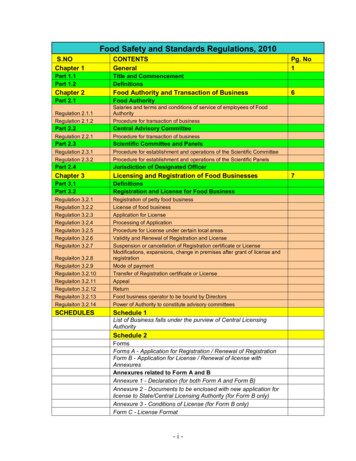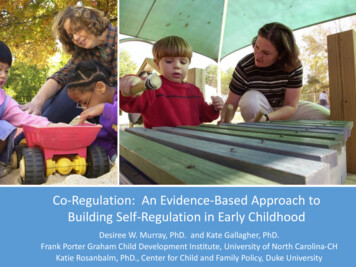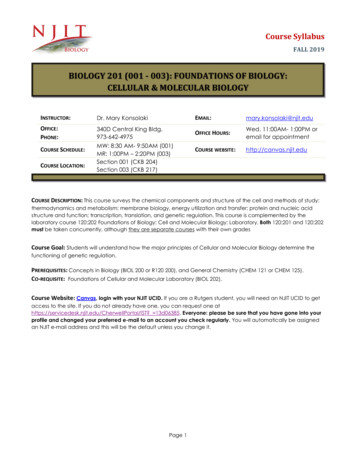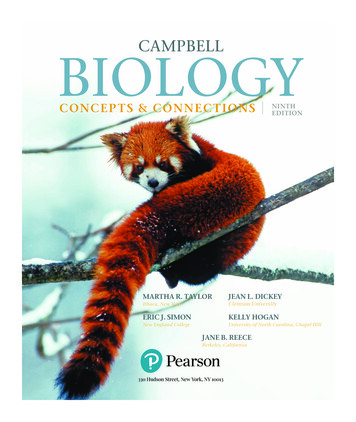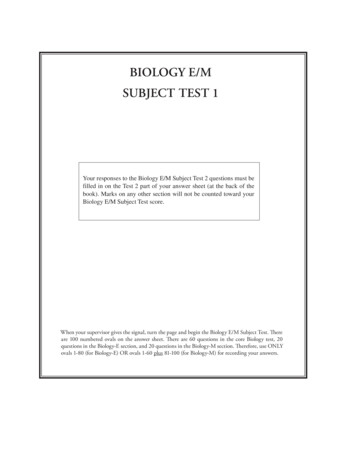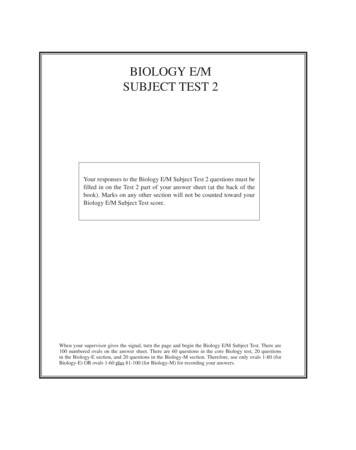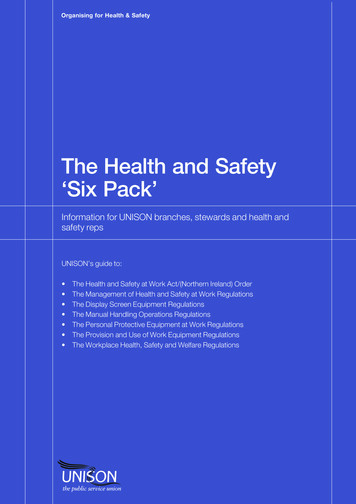
Transcription
Neuro-biology, Coregulation and ToxicStress ManagementA National Overdose Prevention NetworktrainingMay 12, 2021
S. Brooke Briggance-Director of Cypress Resilience Project at Public Health InstituteDeputy Director of FACES for the Future Coalition at PHICertified Instructor in all forms of Mental Health First AidCertified Trauma Informed Practice and Systems specialistwith Alameda County Behavioral Health- Certified Grief Recovery Specialist- Originally from Michigan, NY 6 years, moved to California in 1999- Mother of three sons – Ian, Benjamin and Elijah Cypress Resilience Project, 2020.
“The expectation that we can beimmersed in suffering and loss dailyand not be touched by it is asunrealistic as expecting to be able towalk through water withoutgettingPaulaGonzález, ACSWwet.”- Rachel Naomi Remen, MD
DEFINITION OF TRAUMA Individual trauma results from an event,series of events, or set of circumstancesthat is experienced by an individual asphysically or emotionally harmful orthreatening and has lasting adverseeffects on the individual’s functioningand physical, social, emotional, orspiritual well-being. It overwhelms an individual’s orcommunity’s resources to cope andfrequently produces a sense of fear,vulnerability, and helplessness.
TermCommonTraumaTerminologyDefinitionADVERSE CHILDHOODEXPERIENCES (ACEs)Single or multiple exposures and/or eventsexperienced during childhoodACUTE TRAUMAA single, time limited traumatic eventCHRONIC TRAUMAMultiple traumatic exposures and/or events overextended periods of timeTOXIC STRESSAdverse experiences that lead to strong,frequent, or prolonged activation of the body’sstress response systemSECONDARY TRAUMA/VICARIOUS TRAUMAExposure to the trauma of others as experienced,realized, or imaged by providers, familymembers, close friends, or partners in closecontact with traumatized individualsCOMPASSION FATIGUECumulative physical, emotional, andpsychological effects of traumatic stories
When we areexposed toooften and fortoo longCONTEXT: A Definition of “Toxic Stress”Adverse experiences that lead to strong, frequent,or prolonged activation of the body’s stressresponse system.Yerkes-Dodson Law of Arousal9
How this becomes unhealthy for us: Ideally our body’s stress response would be quick but short Over time we increase in sensitivity – we get activated more oftenand with less stimuli We have trouble getting back to a baseline That has health consequences for us over time Cypress Resilience Project, 2020.
What are some of the consequences?Issues with memoryAttention and concentrationIrritabilityWeight gainIncrease in blood pressureMuscle tension/spasmsChanges in menstruationGastro-intestinal issuesSleep disruptionsHeadache/migraineAnxiety or depressionFatigueSuppressed immune systemFood cravingsReproductive health issuesChanges in respiration Cypress Resilience Project, 2020.
People who have been “triggered” are having astress response that can continue to escalate.The part of the person’s brain that isin charge of survival “takes over.”Our reactions matter. Cypress Resilience Project, 2020.
We have things working in our favorNeuro-plasticity: We have cellular plasticity until approx. age 25 andwe have synaptic plasticity ALL OF OUR LIVESWE CAN RE-LEARN THINGSWe know from the science that PROTECTED SPACE ANDPROTECTED RELATIONSHIPS help support the brain’s healing Cypress Resilience Project, 2020.
A four-part process1. Know activations2. Limit toxicity in the space3. Add protective factors4. Create accountability structure Cypress Resilience Project, 2020.
CalmnessFamily yRespectSENSE OF IGIONdignityLOYALTY lityCOMPASSIONIntegrity!"# %&'()*% ,- educationPassionEXPERIENCEDIVERSITY
“What is wrong with you?”me?”us?”
“What has happened to you?”me?”us?”
GET YOUR OWN RIDERBACK ON THE HORSEYou may not have expected escalationYou may feel hurt or surprisedLeverage mirror neurons to your advantage Cypress Resilience Project, 2020.
Co-regulation communicationBe CaringI care about this situation and I’m here to help.I’m so glad you are telling me this story.Be ConsistentI’m right here and I’m going to listen to whatyou have to say so we can find a solution.Be CuriousHow did you find out? Do you know when youstarted feeling this way? Cypress Resilience Project, 2020.
Thought Exercise Think about toxic or unsafe spaces – what do they have in commonfor you? Why do you feel vulnerable in that space? Now the same for toxic or unsafe relationships Are there qualities of these types of spaces or relationships presentin my organization? Cypress Resilience Project, 2020.
What are protective factors/buffers?When we think of the places and relationships where we feel safest .What do they feel like?What do they smell like?What do we see in them?What do we hear in them?How can we add in those smells, sights, sounds into our work and homeenvironments. How does someone experience my organization asprotective space? How do they experience me as a protective person? Cypress Resilience Project, 2020.
Creating Certainty in Uncertain TimesThe brain does not react well to uncertaintyHow can we create a sense of certainty even when things feel outsideof our control?MICRO-ROUTINES that include protective factors aggregate and helpthe brain find a sense of stabilityOrganizations that are predictable help support a trauma informedapproach Cypress Resilience Project, 2020.
Post-Traumatic Growth is our Goal!65% of people who experience trauma experience PTG This includes things like:Greater self-understandingRealignment with valuesBetter time managementFocus on expressionRenewed relationshipsRemoval of toxinsChanges in work, location etcIdentifying needs Cypress Resilience Project, 2020.
“With the magnitude of suffering atplay on the planet right now, we arein desperate need of folks who havethe wherewithal and courage to bepresent”.Laura Vandernoot Lipsky
Questions / ConversationS. Brooke BriggancePublic Health InstituteCypress Resilience ProjectFACES for the Future Coalitionbrooke.briggance@phi.org Cypress Resilience Project, 2020.
Neuro-biology, Co-regulation and Toxic Stress Management A National Overdose Prevention Network training May 12, 2021

